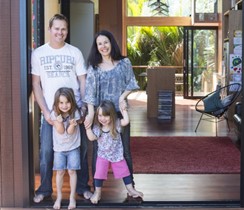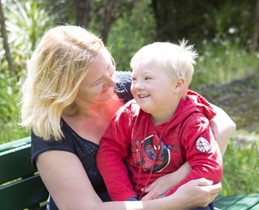12 ways to be a happier person and parent

Studies show parenting small children can be full of joy yet highly stressful, writes Dr Melanie Woodfield. But there are ways to boost the cheerfulness factor
Sitting in a café late at night, she realised she was happy. Chatting with a close friend, sipping a mug of hot chocolate next to a roaring fire (okay, gas heater), with the kids tucked up asleep at home. Bliss. But this moment was the exception, rather than the rule. Most days, at home with the kids, there was stress, tiredness and frustration. What was wrong with her? Why wasn't she "café happy" all the time? Everyone else seemed to be…
Many a coffee group, online forum, or psychologist's sofa is home to a parent who wants to be happier. Until recently, research has suggested that parents of young children are among the unhappiest people on the planet. We all want to be happy. I haven't yet met anyone who is desperate to be depressed. Let's face it, clinical depression is wretched at best, and, putting aside formal diagnoses, unhappiness is miserable by definition. Yet this happiness we seek is almost harder to define than achieve. What is happiness? Is it simply feeling good? Smiling a lot?
Dr Mary Grogan, a clinical psychologist in private practice in Auckland, happiness expert, and member of the New Zealand Association of Positive Psychology, suggests that happiness is "ambiguous and ill defined".
Put simply, happiness is a term that "scientists don't use". Instead, after many years of research, scientists have broken down and defined 16 different types of happiness, which include everything from amusement to joy and pride. In technical terms, happiness refers to subjective wellbeing. Hopefully you've felt it often enough to know what we're referring to.
Interestingly, we tend to imagine that most people are happier than we are. Think for a moment of someone you consider to be very happy. What's different about her? What sets her apart? One of the happiest people I know is Sam, a 35-year-old Aucklander, who previously worked in healthcare but is now a stay-at-home mum of three children, all under six. For some reason, this woman seems to exude happiness and contentment. But Dr Grogan cautions against happiness comparisons. She says, "Everyone who comes into my office points out that everyone else is coping well. I ask them, 'What would they say about you?' and they usually say, "Oh, well I guess they'd think I was coping too.'"
Dr Grogan is refreshingly direct, "Most people are about a six out of 10 most of the time. Being really happy all the time is just unrealistic. We tend to assume everyone is really happy, but they're not."
Isn't it all in our genes?
You may have noticed that happiness is usually pretty stable over the course of people's lives. Some people are just plain happy and others, despite living glorious lives (think stay-at-home mum with a nanny, gardener and cook), are always down in the dumps. Scientists have also noticed that happiness levels tend to run in families. They've studied lots of sets of identical and fraternal twins and have come up with the following conclusion: Our happiness can be broken down into bits that we can change and bits that are out of our control.
According to research from Professor Sonja Lyubomirsky of the University of California, we all have a genetically pre-set disposition for happiness that accounts for about 50% of our quota. Another 40% is our "intentional activity", or how we think and what we do. Surprisingly, our circumstances make up only about 10% of our happiness. That's why Lotto winners often revert back pretty quickly to how happy they were before they won the jackpot. And why the new house/car/boat doesn't really change your life.
But it's nice to know that we can change 40% of how happy we are by changing how we think and what we do. Happiness techniques are easy to get your head around, and it's easy to make small changes that can have long-lasting effects. Happiness researchers have something to say about lots of areas of our lives, like how to spend your money to bring about happiness (buy experiences, not things; buy lots of little pleasures instead of a few big ones; help others instead of yourself) and, especially recently, whether parenting makes us happy.
Parenting and happiness
Anyone who has done a stage one psychology paper at university (or read a self-help book or two) knows that parenting young children is the most stressful period in the family life cycle. Long days, broken nights and unrelenting demands can really take their toll. It's an undeniably stressful time but is it a happy time? In terms of happiness and fulfilment, having a baby seems to make or break people. Some mums in particular seem to find their calling in life, abandon all previous plans and settle happily into a life of stitching cloth nappies and puréeing organic apricots. Others are unfulfilled, under-stimulated, and plain old unhappy. Yet another group feel a bit of both - it can be "the most unhappy, but also the most happy time", according to one mum of two.
Researchers, especially in recent years, have been very interested in how happy parents are as a whole. Unfortunately, and unhelpfully, the conclusions have been really mixed. A 2004 study by Daniel Kahneman and his colleagues provocatively found that Texan working mums preferred watching TV, making dinner and doing the shopping to hands-on childcare jobs. In an about-to-be-published series of studies, Katherine Nelson and her five colleagues at the University of California, Riverside, suggest something a bit different: "Children are associated with more joy than misery."
They asked 7000 Americans to rate their happiness, their satisfaction with life and how often they thought about the meaning and purpose of life. Overall, in contrast to non-parents, parents said that they were happier and more satisfied with life. They also said they thought more about the meaning of life than non-parents, although the authors pointed out that thinking about the meaning of life can be different to actually finding meaning. Interestingly, the effect was strongest on fathers.
But Dr Nelson and her colleagues wondered if there was a bit of a chicken-and-egg thing happening - perhaps happier people were more likely to become parents in the first place. If happiness was indeed linked to parenting, then parents should feel happier when doing parenting-type stuff.
They asked almost 200 parents to describe, blow by blow, what they had done the day before and the positive emotions they had about those tasks, for instance childcare-type jobs, cooking, commuting or watching TV. In a nutshell, they found that taking care of children was linked to more positive emotions, and more meaning, than other activities.
So, while parenting is stressful, it's filled with meaning and purpose. Hurray!
Dr Grogan emphasised that if you're setting goals (number 10 on the list below), it's important to choose goals that are value-based, and not solely focused on narrow definitions of success or failure.
For example, rather than focusing on just having a relationship, focus on the type of relationship you want to have with your partner or children. Dr Grogan echoed Professor Lyubomirsky's warning against social comparisons, pointing out that parents can "lose sight of their own child and their individual strengths" when comparing their child with others. She says that our expectations of how it should be and what sort of child we should raise can get us into trouble fast.
In short, external comparisons and dwelling on our own or others' mistakes is a recipe for unhappiness. Instead, value-based happiness is focusing on the here and now and coming to accept whatever is in front of us, even if it is unpleasant.
Dr Grogan and I often recommend to our clients a technique called mindfulness. This involves simply accepting the moment as it is, not how you wish or want it to be. Mindfulness is a form of self-care, and self-care is so very important for parents. There's a reason why flight attendants suggest that we don our own oxygen mask first, before putting them on our children.
Another quick route to unhappiness can be pursuing a hedonistic lifestyle (things that make us feel good in the here and now) without a counter-balance of longer term goals and a focus on building and using our own strengths. Of course, this is all about moderation. Why shouldn't we have that massage/facial/pedicure/new handbag? But when it gets to moments of thinking, "If I just had that new car/handbag/family-friendly job/nanny/husband I'd be happy", Dr Grogan suggest we're "looking for happiness in all the wrong places".
Instead, she encourages parents to "create a life of richness and meaning" by focusing on our values.
You'll notice that many of the activities on Prof Lyubomirsky's list involve some form of relationship. Happiness researchers stress the importance of social relationships and real connections with others. As a new mum or dad, that social connection can be really tricky to maintain, but it's super important, for most people's happiness, to make an effort.
I think former US president Abraham Lincoln summed it up nicely when he said, "Most people are about as happy as they make up their minds to be."
Rather than an elusive notion that's always just out of reach, happiness can be created and shaped within our lives. True happiness is demonstrated by our actions and reactions. Are you happy to give it a try?
Happiness: a recipe
Professor Lyubomirsky's book, The How of Happiness, suggests there are 12 scientifically proven ways to feel happier. She reminds us that our set point is fixed and constant but our happiness level (the 40% part) can shift, depending on how we think and what we do. She also points out that, depending on your personality, some of these activities will fit better than others.
Here are her suggestions.
1. Express gratitude
2. Cultivate optimism
3. Avoid over-thinking and social comparisons
4. Practise acts of kindness
5. Nurture social relationships
6. Develop strategies for coping
7. Learn to forgive
8. Increase flow experiences - those times when we're so intensely absorbed in the present moment we lose track of time and don't notice what's going on around us
9. Savour life's joys
10. Commit to your goals
11. Practise religion and spirituality
12. Take care of your body - meditation, being active and acting like a happy person.
| Dr Melanie Woodfield is a clinical psychologist in Auckland. She's happiest when spending time with her hubby and kids, but browsing real estate, eating things she shouldn't, digging in the garden and drinking dessert wine come a close second. |

AS FEATURED IN ISSUE 20 OF OHbaby! MAGAZINE. CHECK OUT OTHER ARTICLES IN THIS ISSUE BELOW

















